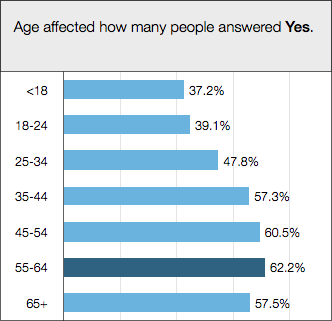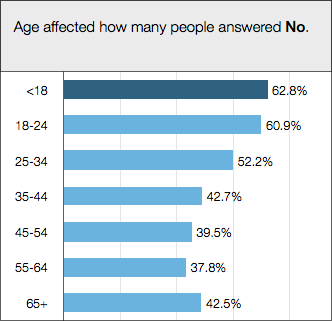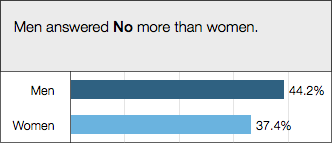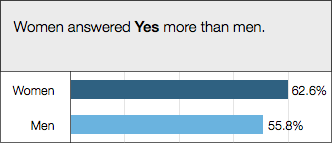Much was made of a recent study from the Trust for America's Health regarding the rapid increase in obesity in the U.S., particularly the claim that over 44 percent of the U.S. population will be obese by 2030. Frankly, it's horrifying.
But do people really know they are that overweight? We wondered if our data on consumer self-awareness (or lack thereof) could shed some light on how to solve obesity problems. Or maybe it could just yield a bunch of silly observations that have no larger significance whatsoever. For now, we're focused on the latter. Fortunately, we have a "robust" amount of data on U.S. consumers and their weight perceptions.
Over the past year, we asked more than 130,000 Americans a simple question -- "Do you consider yourself to be overweight?" -- with a super-simple yes/no response set. We then queried thousands of other respondent attributes in our database and flagged some of the more fascinating and quirky cross tabs.
Now, let's be really clear. We are obviously dealing with a significant self-reporting bias when we ask people about their own weight. Some people, who ARE overweight, might truly believe they're not, while some people who are NOT overweight might actually believe they are. Just remember that this is a commentary on consumer self-image, not obesity.
Let's first look at the overall results:

According to our data, a full 58 percent of U.S. consumers consider themselves to be overweight. This would seem to conflict slightly with more empirical data from the Centers for Disease Control, which concluded that 69.2 percent of Americans are, in fact, overweight. (See: "self-reporting bias," above.)
Let's now look at the profile characteristics of the people in these two categories. Who actually thinks they are overweight and who doesn't? Here we can look at the respondents based on age:


Clearly, the question correlates very heavily with age, where those who are 35 and up (peaking at 55-64) say yes, they are overweight, while younger respondents are increasingly more likely to say no.
The gender gap is pretty clear too.


As can be seen in the chart above, women are significantly (at least statistically so) more likely to consider themselves to be overweight than men. Ironically, medical research has concluded that men are actually far more likely to be overweight, regardless of what they might think. It's always funny when our research confirms the prevalence of the stereotypical male ego.
Once we got beyond the basic demographics, we were amazed at some of the associations we found. First, let's talk about one factor that did NOT correlate:
Having School-Aged Children -- It turns out that there was no meaningful relationship between someone identifying themselves as overweight and the likelihood that they had young children. For those of us with little kids, we know the health perils of little sleep, even less exercise, and an obligation to Hoover up the leftover chicken nuggets and ranch dressing on Jimmy's Spiderman dinnerware (but I digress). Alas, there doesn't seem to be any widespread correlation at all.
Now we can look at some of the demographic factors that did correlate closely with a respondent's self-image about their weight:
Income -- People making over $150,000 per year were the LEAST likely of all income groups to consider themselves overweight. People making between $75,000 and $99,000 were the most likely.
Education -- Similarly, 55.5 percent of people with advanced degrees described themselves as overweight vs. 60.7 percent of people with only a high school degree.
Race -- 60 percent of white respondents claim to be overweight, as compared to 54 percent of blacks, 53 percent of Hispanics, and only 41 percent of Asian respondents.
And now for some of the more entertaining correlations we found:
Are Democrats really more likely to be overweight or just more honest about it?
Hey Weight Watchers, you should really start buying more ads on CBS.
Well, duh.
Again, duh.
Not that surprising.
Maybe we should spend less time cooking and more time cleaning or doing yard work.
Another unsurprising one.
At least overweight people aren't weighed down by big wads of cash in their pockets.
Sir, put down the Pepsi and step away.
Grab a Red Bull instead.
Think about that the next time you start a game of Farmville or Words with Friends.
This was a random one but remarkable to see so high on our list. Maybe Weight Watchers should get Ms. Bullock in their next ad campaign.
I hope you had fun with this post. If you take anything from it, try to be honest with yourself about your weight. If you find yourself buying a Pepsi with a debit card at Burger King, then drinking it on the subway ride home before settling in for an episode of NCIS, you might be heavier than you think.
For more by John Dick, click here.
For more health news, click here.